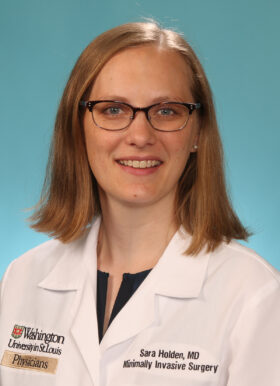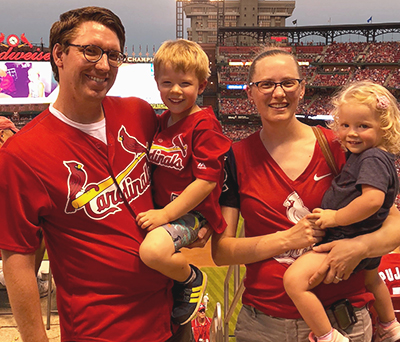Sara Holden, MD

Sara Holden, MD, is a minimally invasive surgeon who specializes in abdominal wall hernia repair, minimally invasive management of benign foregut disorders, gastroesophageal reflux disease (GERD), endoscopic treatment of achalasia (POEM procedure), gallbladder surgery, and solid organ surgery (adrenal, spleen).
Dr. Holden sees patients at:
- Center for Advanced Medicine, Gastrointestinal Center, 4921 Parkview Place, Suite 12B, St. Louis, MO 63110
- Barnes-Jewish West County Hospital, Medical Building One, 1040 N. Mason Road, Suite 120, Creve Coeur, MO 63141
Please call 314-454-8877 for an appointment.
What happened in the course of schooling to influence you to choose your specialty of minimally invasive surgery?
My surgery rotation in medical school was at the very end of my third year. Up until that point I had not experienced a specialty that I wanted to pursue. The first day I stepped into the operating room I had the sense that this was where I was meant to be and what I was supposed to do.
Throughout the remainder of my medical school at the University of Minnesota, I had wonderful mentorship within the Department of Surgery that was instrumental in my pursuit of a surgical career. During my general surgery residency at the University of Wisconsin I also had strong clinical, academic, and personal mentorship from numerous surgeons.
Ultimately, what drove me into minimally invasive surgery was the wide variety of cases and the constant drive for innovation within the field. My particular interest in abdominal wall hernia repair was further fueled during my fellowship year working with my now partner, Dr. Jeff Blatnik. He fostered my interest in complex hernia repair and my enthusiasm for tackling these very difficult problems.
What brought you to Washington University?
Initially what brought me to Washington University was that I was lucky enough to match at Washington University for my fellowship in minimally invasive surgery. The vast array of complex operations performed within this division make it one of the premier fellowship programs in the country. As an added bonus, the faculty here are not only extremely academically and clinically accomplished, but they are genuinely good people. I feel very fortunate to have joined this division as a faculty member, and I hope to contribute to its continued growth.
In addition, my husband is also a physician and he had completed his fellowship training when I did and was also searching for a faculty position. As luck would have it there was a fantastic opportunity for him in geriatrics within the Department of Medicine, and we were both thrilled to accept positions here.

Which aspect of your practice is most interesting?
The aspect of my practice that is most interesting is the repair of complex ventral incisional hernias (abdominal wall hernias). It is very gratifying to operate on a patient with a large hernia that may be severely impacting their quality of life. Restoring a functional abdominal wall in those patients can be life changing for them, and it is wonderful to be a part of that.
Robotic surgery is also a fairly new development in hernia surgery. The surgical robot is allowing us to continually push the boundaries of minimally invasive hernia surgery in the right patient population, and this is only going to continue to expand in the future.
What new developments in your field are you excited about?
The development in my field I am most excited about right now is robotic surgery in the field of hernia. Robotic surgery allows us to repair complex hernias using minimally invasive techniques – oftentimes with just a few small incisions. Sometimes I am amazed at the end of a case how much work can be done through those small incisions.
There are also new developments with types of mesh that we use — whether it’s synthetic, biologic, or absorbable biosynthetic mesh. I feel that advancements in this area will continue to grow and play a huge role in how we repair hernias.
Has there ever been a case where a surgery started as minimally invasive, but you had to switch and do an incision?
Yes. There are times when we have to adjust our course of action in the operating room. I always tell patients if I start their operation minimally invasively, there is always the possibility that we may have to alter that plan for one reason or another and make an incision.
Do you try to do the majority of your surgeries minimally invasively?
I would say in the correct patient population we are most often able to do minimally invasive surgery for certain types of hernias. But there are times we don’t consider minimally invasive surgery — if hernias are very large, the scars are large, there are multiple recurrent hernias, or there are multiple pieces of mesh in place. In the right patient population, laparoscopic or robotic surgery is a great option, but it is not an option for all patients.
Where are you from?
I am originally from Eden Prairie, Minnesota which is a suburb of the Twin Cities. I stayed there through high school until I attended college at Truman State University in Kirksville, MO. I studied pre-medical sciences and health sciences, and was a soccer player. It was a busy four years, but I wouldn’t trade it for the world.
When I left Missouri after college, I never thought I would be back! Now here I am at Washington University, and I feel very fortunate to be working at this remarkable academic institution.
What have you enjoyed most about your move to St. Louis?
We have two young kids and really enjoy the family-friendly nature of the city. There are an endless number of attractions for kids – the zoo, botanical gardens, museums, Cardinals and Blues games. Plus we really love classical music and musicals, so having both the Fox Theater and the St. Louis Symphony Orchestra so accessible has been wonderful.
Which particular award or achievement is most gratifying?
The award or achievement that is most gratifying would be a tie between two awards. One was an award I received as a resident for medical student teaching. I have been extremely fortunate to have had tremendous education and mentorship throughout my training, and that has greatly influenced my enthusiasm for passing this on to younger generations of physicians.
The other award I am really proud of is the one I received as a student athlete in college. I was named the NCAA Woman of the Year for the state of Missouri, which is a reflection of academic and athletic success, as well as a commitment to community service. This balance in life is something I continue to strive for daily as a working mother and surgeon.
When did you have time to have children?
That’s a great question! There was no ideal time, but having a family was a priority for us. I had my kids during my 2nd and 4th clinical year of general surgery residency. Looking back, it was an extraordinarily busy and hectic time, as both my husband and I were in the thick of our medical training. I do sometimes wonder how we managed to come out of it all on the other side still smiling, but you have to make time for things that are important to you. I am enormously blessed to have my family, and to have had amazing support both at home and at work to make it all possible.
What is the best advice you’ve received?
The best advice I have ever received was something my father once told me. He said, “Everybody in life carries a metaphorical suitcase. When difficult things happen, it is like a rock you have to pick up and put in your suitcase. Your load gets a little heavier, but it is your job to pick up that suitcase and keep moving forward.”
I think that is very applicable to so many situations in life, including within the practice of medicine. We deal with patients who have complex problems, and we do our very best to give them the best result possible. Oftentimes everything works out well, however, occasionally complications arise. When these situations occur, it is difficult for the patient as well as the provider. Ultimately, I take these situations and learn as much as I can from them, put them in my “suitcase”, and keep moving forward in hopes of providing the best possible care for my patients.
If you weren’t a doctor, what would like to be doing?
If I weren’t a doctor I would want to be a singer-songwriter. I am not saying I am talented enough to do it as a career, but playing guitar and singing brings me a lot of joy.